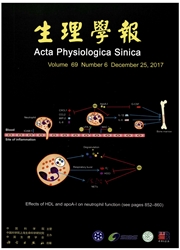

 中文摘要:
中文摘要:
近来的研究表明,神经炎症在帕金森病(Parkinson’sdisease,PD)的发病过程中起着重要的作用,因此通过抑制神经炎症而保护黑质多巴胺能神经元可能是一种具有潜力的治疗策略。本研究组前期的临床试验表明,灵芝(Ganoderma lucidum,GL)具有潜在的神经保护作用,可能通过抗炎及免疫调节机制发挥其保护作用。本研究在神经元-小胶质细胞共培养的模型中观察了GL的神经保护作用,并探讨其可能的保护机制。小胶质细胞单独或与MES23.5多巴胺能神经细胞共培养,脂多糖(lipopolysaccharide,LPS,0.25μg/mL)孵育24h作为阳性对照,试验组分别加入GL提取物(50~400μg/mL)和/或MPP+处理的MES23.5细胞膜碎片(150μg/mL);检测小胶质细胞激活情况及其产生的有害因子和MES23.5细胞[3H]DA摄取能力。结果显示,LPS或MPP+损伤的MES23.5膜碎片均可激活小胶质细胞。同时,GL提取物可以显著降低小胶质细胞源性炎症因子和细胞毒性因子(NO、TNF-α、L-1β)的产生,并呈一定的浓度依赖性;并同样可以下调TNF-α和L-1β mRNA水平的表达。此外,GL还可明显对抗由小胶质细胞激活和MPP+介导的多巴胺能神经细胞[3H]DA摄取抑制。以上结果提示,GL主要通过抑制小胶质细胞激活,减少其神经毒性因子的释放而保护多巴胺能神经细胞。GL可能成为治疗PD的潜在药物。
 英文摘要:
英文摘要:
Abundant evidence has suggested that neuroinflammation participates in the pathogenesis of Parkinson's disease(PD).The emerging evidence has supported that microglia may play key roles in the progressive neurodegeneration in PD and might be a promising therapeutic target.Ganoderma lucidum(GL),a traditional Chinese medicinal herb,has been shown potential neuroprotective effect in our clinical trials that lead us to speculate that it might possess potent anti-inflammatory and immunomodulating properties.To test this hypothesis,the present study investigated the potential neuroprotective effect of GL and underlying mechanism through inhibiting microglial activation using co-cultures of dopaminergic neurons and microglia.The cultures of microglia or MES23.5 cells alone or together were treated for 24 h with lipopolysaccharide(LPS,0.25 μg/mL) as a positive control,GL extracts(50-400 μg/mL) or MES23.5 cell membrane fragments(150 μg/mL) were used in treatment groups.Microglia activation,microglia-derived harmful factors and [3H]dopamine([3H]DA) uptake of MES23.5 cells were analyzed.The results showed that microglia were activated by LPS and MPP+-treated MES23.5 cell membrane fragments,respectively.Meanwhile,GL extracts significantly prevented the production of microglia-derived proinflammatory and cytotoxic factors,including nitric oxide,tumor necrosis factor-α(TNF-α) and interleukin 1β(IL-1β),in a dose-dependent manner and down-regulated the TNF-α and IL-1β expressions on mRNA level.In addition,GL extracts antagonized the reduction of [3H]DA uptake induced by MPP+ and microglial activation.In conclusion,these results suggest that GL may be a promising agent for the treatment of PD through anti-inflammation.
 同期刊论文项目
同期刊论文项目
 同项目期刊论文
同项目期刊论文
 期刊信息
期刊信息
